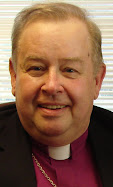Greetings dear friends in Christ! It's been warm (hot by English standards!) and humid here in Canterbury today.
The day began with the regular schedule of Holy Eucharist, Bible study and prayer, and Indaba groups. Today's theme focused on interfaith relationships.
In the afternoon the second of two hearings was held by the Windsor (Report) Continuation Group (WCG). About twenty speakers from around the Communion spoke to the third part of the group's proposals following up on the Windsor Report. As you may remember, the Windsor Report called for three moratoria: (1) on same-sex blessings; (2) on the ordination of partnered gay priests to the episcopate; and (3) on the incursion of foreign bishops into territories outside of their jurisdiction. In the Windsor Report, the first two of these moratoria are to last until such time as the Communion as a whole reaches consensus. You can pretty much imagine, I suspect, how the conversation proceeded: very strong opinions expressed on all sides of the matter. The comments will feed into the WCG who will issue a report in anticipation of the meeting of the Anglican Consultation Council in May 2009.
It was particularly striking for me to hear the witness of two bishops in particular. The first was Bishop Michael Ingham. He reminded the hearing that the Windsor Report is exactly that, a report. It was requested by a body with no jurisdiction and one that has no authority to impose its positions on any of the 38 self-governing churches (or provinces) of the Anglican Communion. Unfortunately, Bishop Ingham reminded us, the Windsor Report has been elevated to be the standard by which Anglicans are to live together and has become such without our input or consent, and its interpretation seems to get more rigid by the day. Some suggest that the Windsor Report is the only way to save the Anglican Communion. Others suggest that it's having the opposite effect and that the increasing dogmatism toward the proposals of the Windsor Report will kill the generous spirit of historic Anglicanism even if the Communion holds together structurally. The all-or-nothing manner in which the Windsor proposals are being embraced might well hold the Anglican Communion together, but we will be a faint shadow of the great missionary movement for Christ we have cherished through the centuries.
The other bishop whose words were particularly inspiring was Duncan Gray, the Bishop of Mississippi. Bishop Gray spoke powerfully about his own journey of "discovering church" among those with whom he disagrees on issues and how important it is to him to stay in fellowship and communion with them. He witnessed to the fact that he has "discovered church" in lots of surprising places in the Episcopal Church and is deeply grateful for all that means. I can say, without qualification, that I have "discovered church" in the life and witness of Bishop Gray. Thank you, +Duncan, for taking your part in making the Episcopal Church the oasis of grace that it is for so many.
In listening to Bishop Gray I was reminded again of one of the things I am most grateful for in being an Episcopalian. In much of the Anglican Communion the churches are deeply divided, perhaps stratified, over issues of churchmanship, ecclesiastical pedigree, and Anglomania (or the lack of it). Fortunately, the Episcopal Church throughout our history has largely dodged that sort of division. We have our evangelicals and our Anglo-Catholics, our latitudinarians and our traditionalists, and a generous helping of the broad church. But at no time in our history have these factions been as entrenched or as entitled as in many provinces of the Communion. The American prayer book tradition and our generous episcopal polity are largely responsible for saving us from such internal factionalism. Of course we fight about issues from time to time, we take sides and squabble for a season, but entrenched camps are not in our ecclesiastical DNA as they are in some parts of the Anglican Communion. Even here at the Lambeth Conference, it is easy to observe bishops from other parts of the world treat each other with suspicion because of high church-low church histories, USPG or CMS legacies, and how and when they broke the chains of colonialism. In the Episcopal Church we fight when we disagree; in some other parts of the Communion there is infighting and suspicion even when everything is fine. I'll take our problems any day. Perhaps I'm just used to doing business out in the open for the whole church (and world) to see.
The highlight of today was a barn-burner of a speech from Sir Jonathan Sacks, the Chief Rabbi of the Hebrew Congregations of the Commonwealth. It's going to take a bit more reflection to begin to sort out his address, but I'll be thinking about it and reflecting on it for some time to come. I hope to get a copy of it to read and re-read both for insight and inspiration. More to come on this, but in the meantime, let me suggest to you two of Rabbi Sacks' books: The Dignity of Difference and The Home We Build Together. Both are thought-provoking books, but let me warn you: a thoughtful engagement with the writings of Rabbi Sacks could have life-changing consequences for you! (It has for me!)
Keep the faith, be gentle, love one another.
Blessings!
Bishop Neil
Monday, July 28, 2008
Subscribe to:
Post Comments (Atom)



2 comments:
Very interesting insights into the conference. I appreciate hearing how our little piece of the Communion fits in and compares.
Thanks also for the book suggestions.
Bishop, our prayers continue for you and for Bishop Keith. Glad to see Lynn's sporty hat!
Have you seen Doug and Kaye?
Allison
Post a Comment